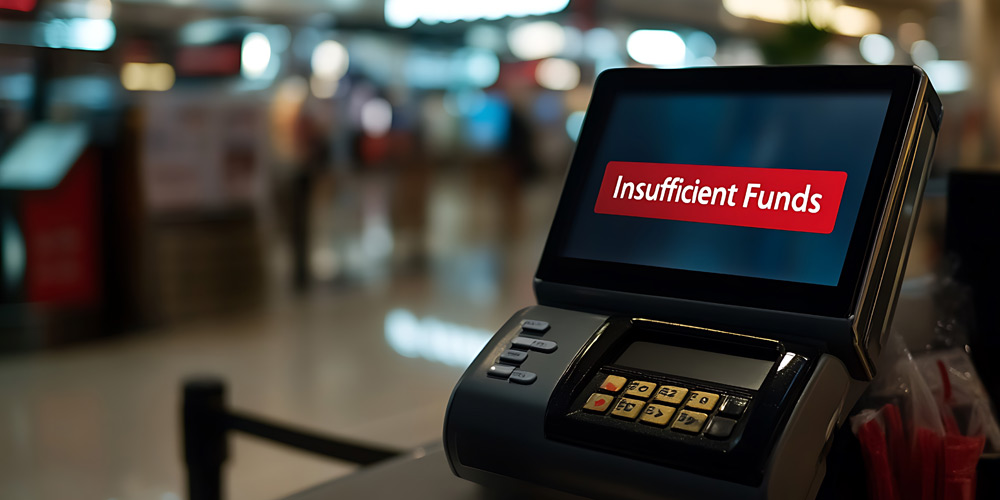What Happens When You Bounce a Check?

What exactly does it mean to have one of your checks bounce? And what should you do if you receive a bounced check? Let’s find out!
A quick checking check-in.
You probably know what happens when you write a check, but just in case, let’s review. When you write a check, you’re instructing your bank to transfer a specified amount of money to the person or entity addressed on the check.
It takes a few days for the money to be transferred from your account after the check is cashed. Remember, the other person has to deposit the check before your funds are removed.
If you don't have the funds in your account to cover the transaction, you can ask the person receiving the check to wait before cashing it. However, there’s no guarantee that they will wait. That’s why, when you write a check, you should treat it like the funds are being removed from your account as you’re writing it. If you don’t have the proper funds in your account when the check recipient attempts to cash the check, the check will bounce.
NSF fees and lost trust.
What happens if someone tries to cash a check you wrote to them and it bounces?
“There are two major consequences of bouncing a check,” explained financial educator Joseph Dillard. “First, you will be charged a Non-Sufficient Funds (NSF) fee. Depending on the financial institution, this fee ranges from $25-$38 per occurrence. That can get expensive!
"Second, you lose trust with the person or merchant to whom you wrote the check. Several merchants do not even accept checks anymore because of the great possibility that they might bounce. Instead, they opt for electronic payments in the form of debit and credit cards.”
Jared Weitz, CEO and Founder of United Capital Source Inc. echoed Dillard’s explanation and added an additional consequence:
“Aside from the bank fee, I think there are many consequences of bouncing a check. The person who the check bounced on now has a notion that you’re no good for checks anymore, and who knows who else they will tell right?
"Also, the bank won’t extend protection against checks bouncing if you have a history of it. There’s also generally a late fee for paying something late and on a percentage basis it’s generally large.”
Well, that’s not great! But what can you do about it?
The best solution is prevention.
The best way to avoid dealing with a bounced check is to never bounce one in the first place.
“The number one way to avoid bouncing checks is to balance your checkbook,” advised Dillard. “Many people do not write in check registers to note deposits and purchases, so they do not know exactly how much money they have in their checking accounts. As a result, they end up giving away money by paying NSF fees.
"These fees can be avoided by balancing their checkbook, so they will know exactly how much money they have when they write a check to make a purchase." You can read more about this on Dillard's ExBanker blog.
However, you can’t change the past. So what should you do if your check bounces? Here’s what Dillard suggests:
“The first thing you should do is get to the bank to make a deposit to make sure enough money is in your account to cover the cost of the NSF fee and to cover the check in case it is presented again. A lot of merchants will present the check to the bank a second time in an attempt to get paid for the item.
"Second, contact the merchant to let them know that you made a mistake but there is enough in your account for the check to be presented again. This will build confidence in the merchant for you.”
What if you receive a bounced check?
While receiving a bounced check does not have the same negative consequences as writing one, it still comes with the disadvantage of not getting the money you need or are owed.
“If you’re on the receiving end of a bounced check, the first thing would be to contact the person that sent it to you for an explanation and then take it from there,” recommended Weitz. “If it’s possible to withhold services or goods until a new check clears, you should.”
Being on either side of a bounced check is not an ideal situation, but with proper precaution and communication, you can lower the odds of being negatively affected.

Joseph Dillard graduated from Northwestern University in Evanston, Illinois in 1989 with a B.A. in Economics. He has been in the financial services industry for 30 years, with 15 years in Retail Banking Management. Joseph also has a Life Insurance license in addition to Series 6 and Series 63 licenses. His experience in Banking and involvement in the community led Joseph to become very passionate about financial education. He wants individuals to learn how to take advantage of the financial services industry instead of being taken advantage of it.

Jared Weitz has been in the financial services industry for over 15 years. Due to his extensive work experience and deep network of close financial relationships, he handles a multitude of different finance options for his clients and contacts. Over the years, he has held positions in some of the largest business financing companies in the U.S. as an Underwriter, Director of Business Development, Managing Partner, and, currently, CEO of United Capital Source, LLC.


